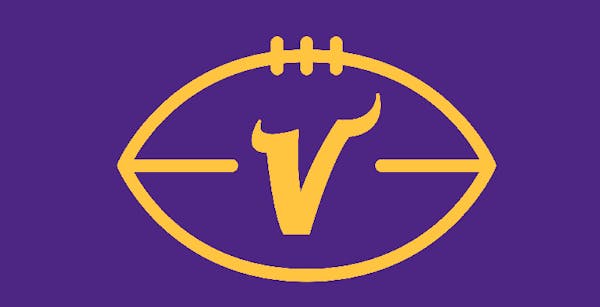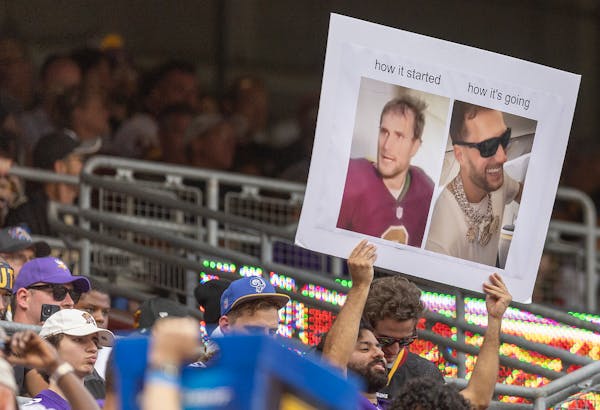Something strange is happening.
The Vikings are winning every close game a year after seemingly losing every close game. And they might face a backup quarterback for the fourth time in six games this week. And their dad-vibes quarterback has become a viral sensation by dancing shirtless while draped in bling, a development equal parts charming and startling.
If the Vikings win Sunday at Buffalo, Kirk Cousins will probably strip to his skivvies and dance with a lampshade on his head, and a fan base previously divided on him will shout in unison, "That's my quarterback!"
As the late, lovable Jerry Burns might say, What the #@!$% is going on here?
"When you're winning," Cousins said Wednesday, "there's a little more wind at your back."
Skeptics continue to attribute the Vikings' 7-1 record to gale-force gusts over-inflating how good the team truly is. That presumption misses a larger point.
Success in the NFL hinges less on style points and more on being opportunistic. Games present a weekly survival test, a referendum on a team's resourcefulness in finding a way when nothing seems to be working.
The Vikings have looked disjointed and the opposite of sharp at times this season. Guess what? So has every team.
Watch a full slate of games on any Sunday. The action often looks like a slog. Sometimes games border on being watchable due to boredom. Then a team makes a big play at a critical moment and wins a close game.
"You don't always win with style," Vikings coach Kevin O'Connell said. "But when you're able to win football games and consistently win close games by winning in the fourth quarter, that does matter."
In the NFL, there are a few really good teams and a few really bad teams, and then everyone else in the middle. The factors that establish a pecking order within that larger group are razor's edge thin.
According to the NFL, 62 games this season have been decided by six points or less. That's the highest number through nine weeks in league history.
The NFL is not college football, where elite teams routinely make light work of inferior opponents. The talent discrepancy within that sport is the size of Lake Superior.
The NFL's talent dispersal creates gridlock. Blowouts are infrequent. The league fancies its parity because gridlock ensures close games and leads to a handful of teams making the playoffs each season that fell short the previous year.
Successful teams figure out how to navigate the gridlock and the slog and capitalize on the fortunate breaks that they create on their own and the ones that the NFL gods hand them. That's how the Vikings are 7-1.
"Good football teams have to find a way to make a play to change the game," Cousins said. "You never know where it's going to come from."
Vikings coaches and players continue to point out that they have not reached peak performance yet. Optics and statistics support that. They rank 15th in total offense, 25th in total defense, eighth in scoring offense and 12th in scoring defense.
They have won games on the strength of being opportunistic: a timely sack, a must-have drive that ends with points, a turnover caused by the special teams.
Here's proof: The Vikings own the second-highest scoring differential in the fourth quarter in the NFL.
The difference in close games compared to last season's belly flops is like driving a beater into a car wash and rolling out with a Mercedes.
"It's a calm approach when we get in these situations," linebacker Eric Kendricks said. "Everybody is calm and patient and no one is trying to do too much. But at the same time, we're ready to make that play. When it comes up, you have to rise to the occasion."
The first two months of the season have been a wild ride. People still don't quite seem to know what to make of the Vikings. This next stretch of four consecutive opponents with winning records will tell us more.
If Cousins keeps dancing on planes, folks will have their answer.

Scoggins: Vikings' Smith is 'Hitman' on field and man of many talents off

Football Across Minnesota: Meet Cam, the can-do star from down south

Scoggins: Getting even meant getting two picks vs. Edina

Scoggins: Among pantheon of Gophers running backs, Taylor has his own special traits



